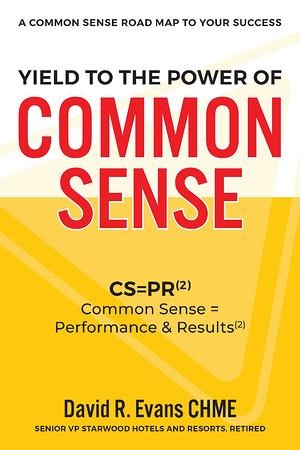By Christopher Durso, Vice President of Content Development, Hospitality Sales & Marketing Association International (HSMAI)
When you’ve been in hospitality as long as David R. Evans, CHME, has, you’ve probably got things down to a science. But Evans does that one better. He’s got things down to a formula, which he explains in his new book, Yield to the Power of Common Sense: CS = PR(2), Common Sense = Performance & Results(2).
 “To me, common sense is just keeping things simple and using your head,” Evans said in a recent interview with HSMAI. “For example, the art of selling is listening, not selling. Common sense says: In order for you to sell something, get to know your customer. Common sense says: If you’re a manager or a leader, listen to your associates, listen to your customer, and don’t tell anybody what to do or what not to do. Common sense fundamentally to me is just being a very good listener and a learner.”
“To me, common sense is just keeping things simple and using your head,” Evans said in a recent interview with HSMAI. “For example, the art of selling is listening, not selling. Common sense says: In order for you to sell something, get to know your customer. Common sense says: If you’re a manager or a leader, listen to your associates, listen to your customer, and don’t tell anybody what to do or what not to do. Common sense fundamentally to me is just being a very good listener and a learner.”
Evans would know. He started his career as sales manager for The Olympic Hotel in Seattle in 1961, moved to the Century Plaza Hotel in Los Angeles three years later, and eventually became vice president of sales and marketing for Western Hotels International (later Westin),which managed the Century Plaza. When he retired in 2000, he was senior vice president of global sales and marketing for Starwood Hotels & Resorts. A few years later, he started David R. Evans & Associates, which provides hotel sales and marketing consulting.
Evans majored in radio and television at the University of Washington and originally had planned to become a film director, but that background still came in handy when he ended up at the Century Plaza, where he booked the Emmy Awards, the Grammy Awards, the affiliate meetings of all three TV networks, and other show-business events. In Yield to the Power of Common Sense, he intertwines stories from his career with his advice for talking small and doing big.
What was it about the hospitality industry that drew you and kept you around for so long?
Well, being in Los Angeles at the Century Plaza at that time was like golden years. This hotel became the premier hotel in the USA, ranking alongside the Waldorf-Astoria in New York or the Palmer House in Chicago. And just being there in Los Angeles, was working on the outside and looking in at the entertainment business, was very exciting. I was just very blessed to build a team, and then I became the youngest vice president of [Western, which managed the Century Plaza] in 1973, and there was no reason to leave after that.
Why did you want to write this book?
I had to leave Starwood [which acquired Westin in 1994] after 39 years because I had heart issues and had a heart transplant in 2000. It took me a few years to recover, and I kind of got bored. And a friend of mine, who’s now passed away, said, “Dave, why don’t we join up and become consultants or advisers?” And so in 2004, I created David R. Evans & Associates.
At the same time, a longtime former associate of mine, Steve Halliday, was executive VP of Pan Pacific Hotels. They were going to build a hotel in Seattle and the owner of the hotel was to be Paul Allen, who owned the Seattle Seahawks; his company’s called Vulcan. Steve said, “I want you to see if you’ll work with Vulcan and advise in the sales and marketing of this hotel.” It was a no-brainer. I had done this many times in my career.
One of the things that’s always bothered me about marketing plans in the hotel business is, they lacked common sense, because they were long on verbiage and short on action. And to me, common sense says that you’re better off to reverse the process. We had to go before the asset manager and the Vulcan team to give them a presentation on the pre-opening plan, so I came up with this idea called a Smart Plan and the meeting was long on action and very short on verbiage. I had probably three pages of explanation instead of 75.
We were all nervous as hell, for God’s sake, because here’s one of the wealthiest men in the country and we didn’t want to fail him. I went ahead and presented the plan, and a guy by the name of Gary Zack was the asset manager for the hotel. When it was all over, there was a big pause: “David, that’s the best damn thing I’ve ever seen in the hotel business.”
People used to say, “Dave, why don’t you write about your history?” Because I’ve got a lot of great stories of different people and I’ve learned different things. They’re all in the book.
How did common sense become such a big part of it?
I’d give a little talk about selling. I mean, the art of selling is listening. I started thinking about that, and I said, “You know something, it’s really basically common sense.” Then I went through a lot of crap in consulting. We did convention bureaus and I was absolutely amazed how the lack of common sense was used in so many situations. We were working somewhere and it was a disaster, and I came up with a formula: CS = PR2. I used it there in a presentation. Use your common sense. and your performance and results will be successful. You’ll get twice as much success.
How does the book apply to the hospitality industry as it’s dealing with the effects of the coronavirus pandemic?
I think it’s more relevant than ever, because you’ve got to keep it simple. What common sense says is, if you want to protect yourself, wear a mask. Don’t go to the beach with 27,000 people. And here’s a common-sense thing for me: I believe that people have been locked up so damn long that when the virus goes away or the vaccine comes in and people are allowed to go free again, you will not get a seat on an airplane anywhere. I feel quite strongly that people are just going to want to get on an airplane and fly someplace.
What should hotel salespeople be doing right now to prepare for whatever comes next?
Build relationships. Human nature is still the same, and they need to build relationships and they need to stay in touch with their customers and they need to offer solutions to any kind of a problem they have, if they can. I think the meetings industry is going to absolutely explode within a year or so, because all the people living in their homes and working on their computers, do they want to do that all the time? No. Common sense says, people need other people to react with. It’s human nature that people like to be with people. Common sense says we truly need to build relationships. We need to get out from our computers. We need to go back and hold hands and hug and meet and have cocktails.
